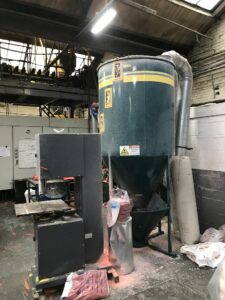Her Majesty’s Prison & Probation Service accepts Crown Censure after prison officers sustain serious burns in training exercise
Her Majesty’s Prison & Probation Service (HMPPS) has been issued with a Crown Censure by the Health and Safety Executive (HSE) after nine prison officers suffered burns in a training exercise.
On 28 June 2018, the prison officers were taking part in a petrol bomb training exercise as part of an eight-day commanders’ course at The National Tactical Response Group (NTRG) training facility when the incident occurred. On completion of the course officers would be qualified to play an important leadership role should a prison disorder take place.
It was an extremely hot day with temperatures in excess of 30 degrees and no breeze. The staff had set up a water fountain near to the exercise space where officers could cool off whilst wearing their protective kit.
Each of the trainee commanders had already completed the petrol bomb activity twice while leading serials of six prison officers, using their shields for protection, navigating a petrol bomb at their feet and a second petrol bomb to the side without any issues.
After those exercises were complete the trainee commanders were told to form into a serial of 18 in three rows of six and were petrol bombed as a group; witness reports state that between four and 10 petrol bombs were thrown. The officers became engulfed in flames, which burnt through their protective clothing, forcing them to break ranks to try and extinguish the flames underneath the water fountain.
The officers suffered burns to their bodies, varying in severity from minor burns and scalds to third degree burns.
“My clothes were burning, my helmet bubbled up and my body armour was charred”, said one of the officers. “One of the petrol bombs hit me on the head and I was overcome with fire, the flames were 12 feet easily, I was really scared as it got hotter and hotter,” said another.
An investigation by HSE found that HMPPS did not call an ambulance to the scene and officers were taken to hospital in a minibus. HMPPS failed to report the injuries to HSE until four months after the incident.
The investigation also found that the practice of petrol bombing the whole group of trainee commanders was not part of the official training and there was no requirement for it in any documentation or training manual. The prison officers interviewed had almost 270 years of service between them and had never been petrol bombed in any live disorder incident.
There was a failure to provide adequate risk assessments for the handling of petrol and the exercise itself. The person making the petrol bombs for the exercise had no recall of being trained in the handling of petrol or having any instruction in how much petrol each bomb should contain; and had created a maximum of 48 petrol bombs consisting of two thirds of a pint of petrol in each milk bottle.
The incident has had long term consequences with some of the officers involved reporting that they continue to suffer from their physical injuries and others from symptoms of post-traumatic stress disorder (PTSD).
Carol Downes MBE, an HSE inspector on HSE’s Defence and Public Protection Team, said: “HMPPS was using practical training to prepare officers to deal with high risk situations of serious disorder in prison establishments. We accept that this type of training comes with an additional level of risk, but this does not mean that the risks during that training should be uncontrolled.
“HMPPS, like any other employer, has a duty to make sure that where work or training is to be done that causes danger, that danger or risk is controlled as far as they reasonably can. Unfortunately, on this day those risks were not adequately controlled resulting in nine prison officers suffering burn injuries.”
By accepting the Crown Censure, HMPPS has acknowledged that but for crown immunity, there was sufficient evidence to provide a realistic prospect of conviction for breaching Section 2(1) & Section 3(1) of the Health and Safety at Work etc. Act 1974.
Notes to Editors:
1. The Health and Safety Executive (HSE) is Britain’s national regulator for workplace health and safety. We prevent work-related death, injury and ill health through regulatory actions that range from influencing behaviours across whole industry sectors through to targeted interventions on individual businesses. These activities are supported by globally recognised scientific expertise. www.hse.gov.uk
2. HSE news releases are available at http://press.hse.gov.uk
3. As a Government body, Her Majesty’s Prison and Probation Service (HMPPS) cannot face prosecution in the same way as private or commercial organisations this is known as Crown Immunity.
4. Section 2(1) of the Health and Safety at Work etc. Act 1974, states that: “It shall be the duty of every employer to ensure, so far as is reasonably practicable, the health, safety and welfare at work of all his employees”.
5. There is no financial penalty associated with a Crown Censure.
6. More information on Crown Censures can be found here: http://www.hse.gov.uk/enforce/enforcementguide/investigation/approving-enforcement.htm [1]
7. The Code for Crown Prosecutors [2] sets out the principles for prosecutors to follow when they make enforcement decisions. HSE’s approach to Crown Censure is set out in its enforcement policy statement[3].
The post Her Majesty’s Prison & Probation Service accepts Crown Censure after prison officers sustain serious burns in training exercise appeared first on HSE Media Centre.
